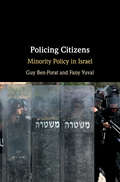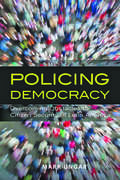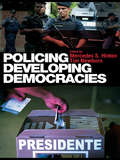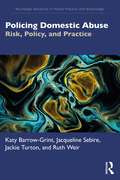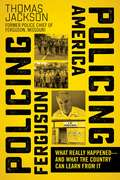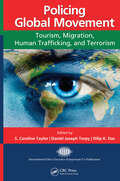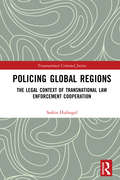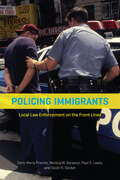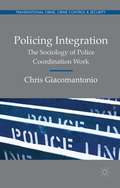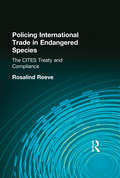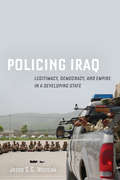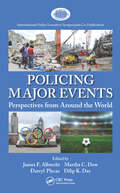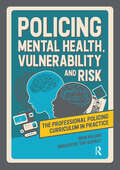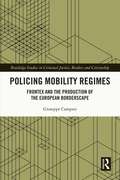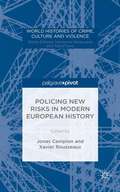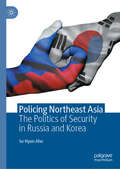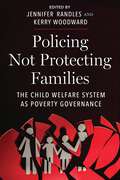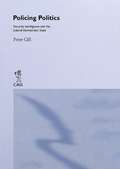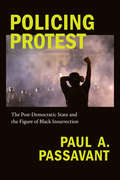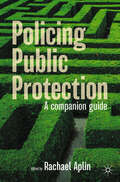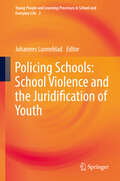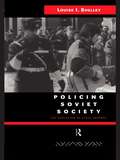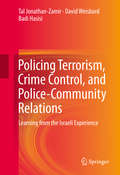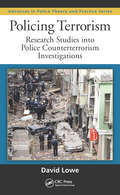- Table View
- List View
Policing Cinema: Movies and Censorship in Early Twentieth-Century America
by Lee GrievesonTracing the discourses and practices of cultural and political elites and the responses of the nascent film industry, Grieveson reveals how these interactions had profound effects on the shaping of film content, form, and, more fundamentally, the proposed social function of cinema: how cinema should function in society, the uses to which it might be put, and thus what it could or would be.
Policing Citizens: Minority Policy in Israel
by Guy Ben-Porat Fany YuvalWhat does police violence against minorities, or violent clashes between minorities and the police tell us about citizenship and its internal hierarchies? Indicative of deep-seated tensions and negative perceptions; incidents such as these suggest how minorities are vulnerable, suffer from or are subject to police abuse and neglect in Israel. Marked by skin colour, negatively stigmatized or rendered security threats, their encounters with police provide a daily reminder of their defunct citizenship. Taking as case studies the experiences and perceptions of four minority groups within Israel including Palestinian/Arab citizens, ultra-Orthodox Jews and Ethiopian and Russian immigrants, Ben-Porat and Yuval are able to explore different paths of citizenship and the stratification of the citizenship regime through relations with and perceptions of the police in Israel. Touching on issues such as racial profiling, police brutality and neighbourhood neglect, their study questions the notions of citizenship and belonging, shedding light on minority relationships with the state and its institutions.
Policing Democracy: Overcoming Obstacles to Citizen Security in Latin America
by Mark Ungar2011 Winner of the Charles H. Levine Memorial Book Prize of the International Political Science AssociationLatin America’s crime rates are astonishing by any standard—the region’s homicide rate is the world’s highest. This crisis continually traps governments between the need for comprehensive reform and the public demand for immediate action, usually meaning iron-fisted police tactics harking back to the repressive pre-1980s dictatorships. In Policing Democracy, Mark Ungar situates Latin America at a crossroads between its longstanding form of reactive policing and a problem-oriented approach based on prevention and citizen participation. Drawing on extensive case studies from Argentina, Bolivia, and Honduras, he reviews the full spectrum of areas needing reform: criminal law, policing, investigation, trial practices, and incarceration. Finally, Policing Democracy probes democratic politics, power relations, and regional disparities of security and reform to establish a framework for understanding the crisis and moving beyond it.
Policing Developing Democracies
by Tim Newburn Mercedes S. HintonThere are enormous challenges in establishing policing systems in young democracies. Such societies typically have a host of unresolved pressing social, economic and political questions that impinge on policing and the prospects for reform. There are a series of hugely important questions arising in this context, to do with the emergence of the new security agenda, the problems of transnational crime and international terrorism, the rule of law and the role of the police, security services and the military. This is a field that is not only of growing academic interest but is now the focus of a very significant police reform ‘industry’. Development agencies and entrepreneurs are involved around the globe in attempts to establish democratic police reforms in countries with little or no history of such activity. Consequently, there is a growing literature in this field, but as yet no single volume that brings together the central developments. This book gathers together scholars from political science, international relations and criminology to focus on the issues raised by policing within developing democracies examining countries in Eastern Europe, Asia, South America and Africa.
Policing Domestic Abuse: Risk, Policy, and Practice
by Jackie Turton Katy Barrow-Grint Jacqueline Sebire Ruth WeirThis book is dedicated to improving the practice of the policing of domestic abuse. Its objective is to help inform those working in policing about the dynamics of how domestic abuse occurs, how best to respond to and investigate it, and in the longer term how to prevent it. Divided into thematic areas, the book uses recent research findings to update some of the theoretical analysis and to highlight areas of good practice: &‘what works and why&’. An effective investigation and the prosecution of offenders are considered, as well as an evaluation of the success of current treatment options. Policing domestic abuse can only be dealt with through an effective partnership response. The responsibilities of each agency and the statutory processes in place when policy is not adhered to are outlined. Core content includes: A critique of definitions and theoretical approaches to domestic abuse, including coverage of the myths surrounding domestic abuse and their impact on policing. An exploration on the challenges of collecting data on domestic abuse, looking at police data and the role of health and victim support services. A critical review of different forms of abuse, different perpetrators and victims, and risk assessment tools used by the police. A critical examination of the law relating to domestic abuse; how police resources are deployed to respond to and manage it; and best practice in investigation, gathering evidence, and prosecution Key perspectives on preventing domestic abuse, protecting victims, and reducing harm. Written with the student and budding practitioner in mind, this book is filled with case studies, current research, reports, and media examples, as well as a variety of reflective questions and a glossary of key terms, to help shed light on the challenges of policing domestic violence and the links between academic research and best practice.
Policing Ferguson, Policing America: What Really Happened—and What the Country Can Learn from It
by Thomas JacksonFollowing the fatal shooting in broad daylight of unarmed African American Michael Brown by a white cop in August 2014, Ferguson, Missouri became the scene of protests that pitted law enforcement against locals and Black Lives matter activists. The media firestorm has not waned, and, in fact, has grown stronger in light of all the recent violence by and against police officers nationwide. According to Ferguson’s former police chief Tom Jackson, the uninformed media actually fans the flames of unrest and exploits the situation: infotainment optics have become more important than truth, while social media spreads the news without providing context. Policing Ferguson, Policing America is the book that finally tells the inside story of what happened in Ferguson, and how good guys became the bad guys through media and political distortion. Pressure is at a boiling point. In 2016, America has been rocked by heart-wrenching fatal shootings of African Americans by police officers in Louisiana and in Minnesota, and by the shootings of police offers in Dallas, Baton Rouge, and Kansas City that left eleven officers dead and a dozen more wounded. To many Americans, the central theme of this continuing bloody story is one of racial injustice and out-of-control policing. Policing Ferguson, Policing America brings common sense and a keen insider’s understanding to a complex story. Black Lives Matter, and so do the lives of cops. Citizens and law-enforcement professionals alike feel the urgent need for our systems and procedures to change for the better. Few people are in a better position to explore the issues than Chief Jackson. In Policing Ferguson, Policing America, Jackson tells for the first time the real Ferguson story while sharing his thoughts about the steps we can take together to improve all Americans’ lives, and restore the vital trust between the police and the communities they serve. His well-informed recommendations just may improve this dire situation.
Policing Global Movement: Tourism, Migration, Human Trafficking, and Terrorism (International Police Executive Symposium Co-Publications)
by S. Caroline Taylor Dilip K. Das Daniel Joseph TorpyThe movement of humans across borders is increasing exponentially‘some for benign reasons, others nefarious, including terrorism, human trafficking, and people smuggling. Consequently, the policing of human movement within and across borders has been and remains a significant concern to nations. Policing Global Movement: Tourism, Migration, Human T
Policing Global Regions: The Legal Context of Transnational Law Enforcement Cooperation (Transnational Criminal Justice)
by Saskia Maria HufnagelThis book provides a stocktake and comparative socio-legal analysis of law enforcement cooperation strategies in four different regions of the world: the European Union (EU), North America, Greater China and Australasia. The work analyses law enforcement cooperation mechanisms within the socio-legal framework of global normmaking. The strategies addressed range from legal frameworks facilitating cooperation to formal and informal police networks and cooperation practices. The study also takes into account crime-specific engagement, for example campaigns focusing on drug crimes, terrorism, financial crime, kidnappings and other offences. It explores challenges in policing practice and human rights protection in each region that could be countered by existing strategies in another. As regions usually develop more advanced cooperation mechanisms than exist at a global scale, strategies found in the former could help find solutions for the latter. To map existing strategies and assess their impact on both human rights and policing practice this study relies on an assessment of the primary and secondary literature sources in each region as well as interviews with practitioners ranging from senior police officers to prosecutors, government officials, customs and military staff. This book presents a valuable resource for academics and postgraduate students, as well as policing and criminal justice practitioners, government officials and policy makers.
Policing Immigrants: Local Law Enforcement on the Front Lines (Chicago Series in Law and Society)
by Doris Marie Provine Scott H. Decker Monica W. Varsanyi Paul G. LewisThe United States deported nearly two million illegal immigrants during the first five years of the Obama presidency--more than during any previous administration. President Obama stands accused by activists of being "deporter in chief." Yet despite efforts to rebuild what many see as a broken system, the president has not yet been able to convince Congress to pass new immigration legislation, and his record remains rooted in a political landscape that was created long before his election. Deportation numbers have actually been on the rise since 1996, when two federal statutes sought to delegate a portion of the responsibilities for immigration enforcement to local authorities. Policing Immigrants traces the transition of immigration enforcement from a traditionally federal power exercised primarily near the US borders to a patchwork system of local policing that extends throughout the country's interior. Since federal authorities set local law enforcement to the task of bringing suspected illegal immigrants to the federal government's attention, local responses have varied. While some localities have resisted the work, others have aggressively sought out unauthorized immigrants, often seeking to further their own objectives by putting their own stamp on immigration policing. Tellingly, how a community responds can best be predicted not by conditions like crime rates or the state of the local economy but rather by the level of conservatism among local voters. What has resulted, the authors argue, is a system that is neither just nor effective--one that threatens the core crime-fighting mission of policing by promoting racial profiling, creating fear in immigrant communities, and undermining the critical community-based function of local policing.
Policing Integration: The Sociology of Police Coordination Work
by Chris GiacomantonioThis book critically examines coordination work between police officers and agencies. Police work requires constant interaction between police forces and units within those forces, yet the process by which police work with one another is not well understood by sociologists or practitioners. At the same time, the increasing inter-dependence between police forces raises a wide set of questions about how police should act and how they can be held accountable when locally-based police officers work in or with multiple jurisdictions. This rearrangement of resources creates important issues of governance, which this book addresses through an inductive account of policing in practice. Policing Integration builds on extensive fieldwork in a multi-jurisdictional environment in Canada alongside a detailed review of ongoing research and debates. In doing so, this book presents important theoretical principles and empirical evidence on how and why police choose to work across boundaries or create barriers between one another.
Policing International Trade in Endangered Species: The CITES Treaty and Compliance
by Rosalind ReeveA comprehensive examination of the way in which the Convention on the International Trade in Endangered Species (CITES) is implemented and policed. CITES is one of the oldest international environmental agreements and has been responsible for some striking conservation successes. But, given the way it has evolved, there are also some critical weaknesses that unscrupulous countries and commercial interests can exploit, especially regarding information, institutions and enforcement. The convention needs reform and this book gives a trenchant critique, including practical and effective recommendations for change.
Policing Iraq: Legitimacy, Democracy, and Empire in a Developing State
by Jesse WozniakPolicing Iraq chronicles the efforts of the Kurdistan Regional Government of Iraq to rebuild their police force and criminal justice system in the wake of the US invasion. Jesse S. G. Wozniak conducted ethnographic research during multiple stays in Iraqi Kurdistan, observing such signpost moments as the Arab Spring, the official withdrawal of coalition forces, the rise of the Islamic State, and the return of US forces. By investigating the day-to-day reality of reconstructing a police force during active hostilities, Wozniak demonstrates how police are integral to the modern state’s ability to effectively rule and how the failure to recognize this directly contributed to the destabilization of Iraq and the rise of the Islamic State. The reconstruction process ignored established practices and scientific knowledge, instead opting to create a facade of legitimacy masking a police force characterized by low pay, poor recruits, and a training regimen wholly unsuited to a constitutional democracy. Ultimately, Wozniak argues, the United States never intended to build a democratic state but rather to develop a dependent client to serve its neoimperial interests.
Policing Major Events: Perspectives from Around the World (International Police Executive Symposium Co-Publications)
by Dilip K. Das James F. Albrecht Darryl Plecas Martha C. DowWhenever a major event requires police intervention, questions are raised about the nature of the police response. Could the police have prevented the conflict, been better prepared, reacted more quickly? Could they have acted more forcefully or brought the altercation under control more effectively? Based upon real case studies of events from all
Policing Mental Health, Vulnerability and Risk (The Professional Policing Curriculum in Practice)
by Brian WilliamsPart of the Professional Policing Curriculum in Practice series, this text covers the important contemporary topic of policing those who may have poor mental health are classed as vulnerable or at risk, which runs throughout the policing curriculum.It examines how policing has evolved when dealing with vulnerable people and covers situations such as county lines, modern slavery and online bullying and harassment. It emphasises the importance of the overall police response as part of a multi-agency approach and promotes the need for individual professional curiosity from police officers. Case studies add to the rich knowledge base provided, and critical questions and examples of evidence-based practice are included to embed understanding and help cement theory. Students will develop their critical thinking abilities and gain the confidence to recognise and deal with the complex issues associated with this topic.
Policing Mobility Regimes: Frontex and the Production of the European Borderscape (Routledge Studies in Criminal Justice, Borders and Citizenship)
by Giuseppe CampesiMore than 30 years after its birth, the Schengen area of free movement is under siege in Europe: new barriers are being erected along land borders, military assets are increasingly deployed to patrol the Mediterranean, while sophisticated surveillance tools are used to keep track of the flows of people crossing into European space. Bringing together perspectives from political geography, critical criminology and legal theory, Policing Mobility Regimes offers a systematic analysis of the impact that Frontex is having on migration control strategies at the EU level and offers a detailed empirical description of the agency’s organization and operational activities. In addition, this book explores the meaning behind the attempt at developing a post-national border control strategy and what effect this might have on the geopolitics of Europe’s borders. It contributes to the wider theoretical debate on the relationships among migration, security and the transformation of borders in contemporary Europe. An accessible and compelling read, this book will appeal to all those engaged with criminology, sociology, geography, politics and law as well as all those interested in learning about Europe’s changing borders.
Policing New Risks in Modern European History (World Histories of Crime, Culture and Violence)
by Xavier Rousseaux Jonas CampionPolicing New Risks in Modern European History.
Policing Northeast Asia: The Politics of Security in Russia and Korea
by Se Hyun AhnThis book explores the progress in and the obstacles surrounding developing comprehensive security cooperation between Russia and South Korea since diplomatic relations were established in 1991 within the framework of economic security. The book focuses on oil and natural gas projects, linking the Trans-Siberian and Trans-Korean Railroads, industrial development in the Nakhodka Free Economic Zone, fishery cooperation, and the arms trade, and examines whether these five aspects of cooperation serve to contribute to building Russian-South Korean bilateral and regional economic security. The author argues that these five aspects of cooperation all have the potential to enhance comprehensive bilateral security and further regional economic security in Northeast Asia. However, Russian-South Korean economic cooperation has been hampered by a number of obstacles, including domestic factors as well as external factors, and prevented Russia and South Korea from fulfilling their potential for creating a cooperative comprehensive security relationship. The author concludes with an assessment on the utility of the concept of multi-dimensional security cooperation as a framework for studying and improving the prospects for Russian-South Korean bilateral relations.
Policing Not Protecting Families: The Child Welfare System as Poverty Governance (Critical Perspectives on Youth)
by Jennifer Randles Kerry WoodwardControlling, surveilling, and punishing poor families through the child welfare systemIn a typical year, one in five US children have some interaction with the child welfare system. Countless other families, particularly those who struggle to care for their children due to poverty or economic insecurity, fear child welfare system involvement. Though imagined as a system that protects children from caregivers’ maltreatment, contributors to Policing Not Protecting Families argue that the child welfare system polices and punishes poor parents who are unable to meet white, middle class parenting standards due to structural inequalities.Bringing together scholars from anthropology, sociology, law, and social work, this collection is the first to critically examine the child welfare system’s role in governing poor, disproportionately Black and Native families. It shows that the child welfare system is a key site of poverty governance, or state control and management of poor families. Chapters bring together empirical research from diverse settings across the US, highlighting the system’s interactions with other state systems and its wide impact on marginalized families. Together the chapters illustrate the failure of the child welfare system to protect children and families from the structural inequalities that shape the lives of poor and other marginalized families.
Policing Politics: Security Intelligence and the Liberal Democratic State (Studies in Intelligence)
by Peter GillNumerous allegations of abuse of power have been made against the domestic security intelligence agencies in the United Kingdom such as police special branches and MI5. These include the improper surveillance of trade unionists and peace activists, campaigns of mis-information against elected politicians and even the elimination' of people believed to be engaged in political violence. Drawing on extensive foreign material and making use of the social science concepts of information, power and law, this book develops a framework for the comparative analysis of these agencies.
Policing Protest: The Post-Democratic State and the Figure of Black Insurrection (Global and Insurgent Legalities)
by Paul A. PassavantIn Policing Protest Paul A. Passavant explores how the policing of protest in the United States has become increasingly hostile since the late 1990s, moving away from strategies that protect protesters toward militaristic practices designed to suppress protests. He identifies reactions to three interrelated crises that converged to institutionalize this new mode of policing: the political mobilization of marginalized social groups in the Civil Rights era that led to a perceived crisis of democracy, the urban fiscal crisis of the 1970s, and a crime crisis that was associated with protests and civil disobedience of the 1960s. As Passavant demonstrates, these reactions are all haunted by the figure of black insurrection, which continues to shape policing of protest and surveillance, notably in response to the Black Lives Matter movement. Ultimately, Passavant argues, this trend of violent policing strategies against protesters is evidence of the emergence of a post-democratic state in the United States.
Policing Public Protection: A Companion Guide
by Rachael AplinThis book explores the effective policing of public protection issues, from chapter authors with varied research and practitioner experience. The collection is aimed at detective police officers in specialist units, response and neighbourhood officers, as well as new recruits in policing public protection. Each chapter offers an understanding of victimology, perpetration, and the effective policing and investigation of such crimes. It explores questions such as why crimes happen, who the victims are, what perpetrators do, and why they might target certain victims. This book explores international literature, the evidence base, past mistakes, and what effective and professional policing should ‘look like’. The intention is to improve the policing and investigation of such complex crimes. Each chapter provides a concise summary, a comprehensive literature review, and a list of key actions for practice that officers should consider. It closes with a list of key resources. These chapters specifically cover the following thematic crime areas such as domestic abuse, child sexual abuse, gendered violence, and trafficking. This book also speaks to local authorities (Social Services, Trading Standards), professionals in Education, Health and Probation, academics, and Non-Government Organisations (NGO) in the charitable sector.
Policing Schools: School Violence and the Juridification of Youth (Young People and Learning Processes in School and Everyday Life #2)
by Johannes LunnebladThis book examines the global phenomenon of school violence and its wide range of behaviours, from school shootings to minor theft, bullying and sexual harassment. Studying the Nordic countries and taking Sweden as an example and case study, the book discusses key features of sexuality, bullying and cyberbullying, radicalization, and violent extremism. It examines different approaches to school violence and discusses them in relation to political and ideological influences, gender relations, and socio-economic conditions. It presents trends in prevention of school violence, policing the school and dilemmas in educating against violent extremism. Since most of the research in this field has been done in post-industrial democracies such as Australia, the UK and the US, the book contributes to the debate by offering new perspectives on violence in schools from the Nordic countries.
Policing Soviet Society: The Evolution of State Control
by Louise ShelleySince its creation immediately after the Russian revolution,the militia has had a broad range of social,political and economic functions necessary to direct and control a highly centralized socialist state.However,as the communst party lost its legitimacy the militia was increasingly thrust into the front line of political conflict.A task it was unsuited to perform.Despite the efforts of perestroika to reform it,the collapse of the Soviet state also led to the collapse of morale within the militia. Louise Shelley provides a comprehensive view of the history,development,functions,personnel and operations of the militia from its inception until after the demise of the Soviet state.The militia combined elements of continental,socialist and colonial policing.Its functions and operations changed with the development of the state,yet it always intervened significantly in citizen's lives and citizens were very much involved in their own control.Over time the militia became more removed from politics and more concerned with crime control,but it always remained a tool of the party. This is the first book to analyze the militia,which was one of the most vital elements of control within the Soviet State.It will be a crucial aid to understanding the authoritarianism of the communist system and its legacy for Russia and the successor states. Louise I.Shelley is Professor at the Department of Justice,Law and Society and the School of International Service at the American University,Washington D.C.
Policing Terrorism, Crime Control, and Police-Community Relations
by David Weisburd Tal Jonathan-Zamir Badi HasisiThis timely and important work takes a critical look at the shifting role of police, who are becoming increasingly responsible for handling terrorism threats on top of their regular responsibilities. With an unprecedented empirical study, the authors of this book examine whether this increased focus on security-related threats may come at the expense of addressing "classic" police responsibilities, such as fighting crime and dealing with local, day-to-day community problems. They also examine whether this shift has had a detrimental effect on police-community relationships and perceptions of police legitimacy, as their role changes from "service" to "suspicion. " Through a four-year, multi-method study specifically focused on the Israel National Police, the authors of this work have examined the effects of this shifting role on a number of key areas of policing concern, namely: police effectiveness at fighting crime and police legitimacy, drawing conclusions applicable to any democratic police force. The results of the study provide a number of concrete recommendations for maintaining effectiveness and community relationships of the police, with increasing responsibilities, challenges, and limited resources. This work will be of interest for researchers in criminology and criminal justice, particularly with a focus on police studies and counter-terrorism; police administrators; and researchers in related disciplines, such as sociology and public administration.
Policing Terrorism: Research Studies into Police Counterterrorism Investigations (Advances in Police Theory and Practice)
by David LoweBased primarily upon information from the UK Special Branch Counterterrorism Unit, Policing Terrorism: Research Studies into Police Counterterrorism Investigations takes you through the mechanics of a counterterrorism investigation. A combination of legal and empirical research, this entry in the Advances in Police Theory and Practice book series e

